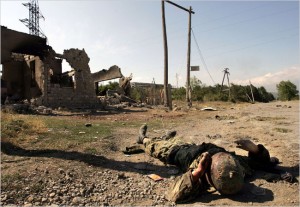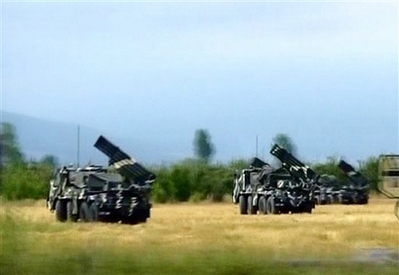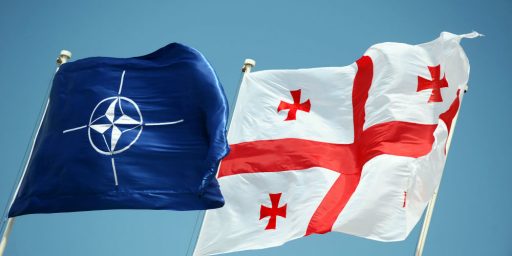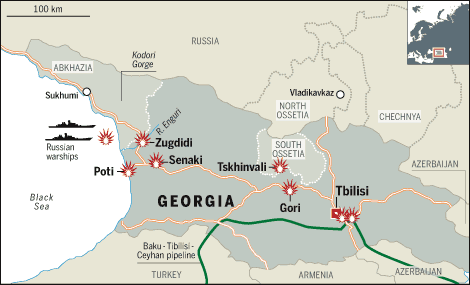Georgian Forces Retreat, Wonder Where Friends Are
 Georgian forces have been routed and have retreated from their South Ossetia province after being outmatched by the Russians. Now, many Georgians are wondering where their Western allies are.
Georgian forces have been routed and have retreated from their South Ossetia province after being outmatched by the Russians. Now, many Georgians are wondering where their Western allies are.
Tony Halpin for The Times of London:
As a Russian jet bombed fields around his village, Djimali Avago, a Georgian farmer, asked me: “Why won’t America and Nato help us? If they won’t help us now, why did we help them in Iraq?”
A similar sense of betrayal coursed through the conversations of many Georgians here yesterday as their troops retreated under shellfire and the Russian Army pressed forward to take full control of South Ossetia.
Andrew Kramer and Ellen Barry for the NYT:
“We killed as many of them as we could,” he said. “But where are our friends?”
It was the question of the day. As Russian forces massed Sunday on two fronts, Georgians were heading south with whatever they could carry. When they met Western journalists, they all said the same thing: Where is the United States? When is NATO coming?
Since the conflict began, Western leaders have worked frantically to broker a cease-fire. But for Georgians — so boisterously pro-American that Tbilisi, the capital, has a George W. Bush Street — diplomacy fell far short of what they expected.
Even in the hinterlands, at kebab stands and in farming villages, people fleeing South Ossetia saw themselves as trapped between great powers. Ossetian refugees heading north to Russia gushed their gratitude to Dmitri A. Medvedev and Vladimir V. Putin, the Russian leaders. Georgians around Gori spoke of America plaintively, uncertainly. They were beginning to feel betrayed.
“Tell your government,” said a man named Truber, fresh from the side of the Tbilisi hospital bed where his son was being treated for combat injuries. “If you had said something stronger, we would not be in this.”
He had not slept for three days, and he was angry — at himself, at Georgia, but mainly at the United States. “If you want to help, you have to help the end,” he said.
[…]
On the other side of the line of battle, Georgians had begun to question the strength of their alliance with the United States.
In recent years, Mr. Bush has lavished praise on Georgia — and the so-called Rose Revolution that brought Mikheil Saakashvili to power — as a model of democracy-building. The feeling was mutual: when Mr. Bush visited Tbilisi in 2005, the authorities estimated that 150,000 people showed up to see him. He famously climbed up on a platform and wiggled his hips to loud Georgian folk music.
Those exuberant days seemed very distant around Gori on Sunday, as people fled, leaving behind corn fields and apple orchards. A group of men tried mightily to push a truck with a blown-out tire, but it got stuck on the road, and they finally abandoned it.
Gato Tkviavi lingered in Tirzini, a village of one-story houses where cows were wandering through the streets. Asked where the border with South Ossetia was, he pointed at his feet. “The border is where the Russians say it is,” he said. “It could be here, or it could be Gori.”
The grimmest among the Georgians were the soldiers, haggard, unshaven and swinging their Kalashnikovs. A group of them had piled onto a flatbed truck, crowding on in such numbers that some were sitting on the roof, their feet dangling over the windshield.
One, who gave his name as Major Georgi, spoke with anger. “Write exactly what I say,” he said. “Over the past few years, I lived in a democratic society. I was happy. And now America and the European Union are spitting on us.”
Indeed.
As sad as the events of the past few days have been, I do not believe that the United States has sufficient interests in Georgia keeping sovereignty over South Ossetia to justify war with Russia. Strong words, and perhaps diplomatic sanctions — including ousting Russia from the G8 — are as much as we can reasonably do.
But here’s the rub: It is the position of the United States government that Georgia should be admitted to NATO. We begged, cajoled, and arm twisted our European allies to that end in Bucharest this past April, ultimately settling for a vague pledge that Georgia will be put on the path to membership soon.
While NATO has become many things since the end of the Cold War, it remains at its essence a military alliance in which an attack upon the territory of any one member is considered an attack on all members. Everything beyond that is a function of the fact that NATO feels itself safe from outside attack and therefore has the resources to do more, including having ambition as a collective security alternative to the United Nations.
If, however, we have no intention of defending Georgia from an attack by the only country on the planet that could conceivably pose it any threat, what the hell are we doing inviting them into NATO?
UPDATE: Matt Yglesias, now ensconced at his new digs at the Center for American Progress, agrees.
Photo credit: Dmitry Kostyukov/Agence France-Presse — Getty Images via NYT
The views in this piece are my own and do not necessarily represent those of my employer.






More; They’re syaing “We helped in Iraq, help us now”. It’s a call we should be paying attention to. If we fail to respond to their call, how will we ask for help from prospective allies in the future?
I wonder if Georgia over plaid their hand and just assumed we’d come running if push came to shove???.
That said, i’ve never bought into the notion that we’ve tarnished our standing in the world to this point. THIS, however, would be a big black eye me thinks.
James,
good question at the end of your post.
It seems that US policy has not been thought through.
Or: The Bush administration thought that they could pretend to be Georgia’s big supporter in the West, because they knew that we Europeans would oppose NATO membership for Georgia anyway, i.e. the US can play the big supporter of Georgia, without being actually required to defend Georgia since those weak Europeans from Venus would not agree to NATO membership anyway.
Doesn’t Russia still have nuclear weapons and ICBM’s? That has to limit the kind of help the US can give Georgia to non-military … I don’t think too many Americans are willing to fight that kind of war over Georgia.
I would think our military attache and other diplomats have made it clear to the Georgian government that it would be a bad idea to launch an attack like they did recently.
Sure I wish we would have sent in troops to help but I would put the responsibility of the whole disaster upon the president of Georgia. He made a decision and he should have thought of the consequences of his decision.
It was obvious they were not ready to deal with the blunt power of the Russians.
This reminds me of the Budapest uprising in 1956. To the end, some of those fighting for freedom expected US paratroopers to come and join the fight. In the end those fighting for freedom where crushed and 30+ years of totalitarian dictatorship followed.
“If, however, we have no intention of defending Georgia from an attack by the only country on the planet that could conceivably pose it any threat, what the hell are we doing inviting them into NATO?”
Being stupid.
There was also rebellions against Saddam in Iraq that expected US help, or the Bay of Pigs invasion in Cuba.
Dr. Joyner, you’ve used this same rhetorical formulation — what the hell are we doing urging NATO to invite Georgia to join NATO if we’re not willing to use force to protect Georgia? — in several posts now. I’ll take it, though, as a non-rhetorical question.
We’re inviting not only Georgia, but our existing NATO allies, and in particular the long-standing Western European NATO allies (most prominently France and Germany), to join with us in a mutual defense pact. Unless and until the pact is formalized, Georgia has nothing but hopes to depend upon in the event it is the victim of Russian aggression. Unless and until the pact is formalized (and notwithstanding any vague assurances about “paths to membership”), neither we nor any other NATO country is pre-committed to help defend Georgia. Although we’re none of us forbidden to rise to that effort even without the commitment that NATO allies have made to one another, as a practical matter there is indeed a lesser probability that any one NATO member, including the United States, is going to find its own individual national interests sufficiently threatened by the Russian action to justify bestirring itself to a military conflict (with its attendant certain costs in blood and treasure, and, here, potential risks of nuclear holocaust).
The recognition of that fact — that membership in NATO is both a benefit and an entanglement — was certainly part of the Bush Administration’s rationale for pushing for Georgian membership. Without the mutual, formal commitment, someone’s going to flinch, and once one major player flinches, others are likely to flinch too. Strong diplomatic statements notwithstanding, so far everyone in NATO is flinching, and John McCain (who’d boot the Russians from the G8 as a starter) is the only one actually proposing something beyond stern diplomatic cables and foredoomed Security Council resolutions.
Certainly there’s a great irony, and some considerable measure of self-contradiction, in the fact that strong formal allegiances with binding and mutual self-defense obligations are the best hope for keeping the peace. After all, it was mutual defense treaties that turned a fight between the Austro-Hungarian Empire and the Serbs into World War 1, and a fight between Germany and Poland into World War 2.
Nevertheless, the NATO alliance did successfully face down the Bear for the second half of the 20th Century; NATO won the Cold War; the constant strain of competing with NATO bankrupted the Soviet empire and led directly to its collapse (at least temporarily; whether permanently, we shall see). Russia still sees NATO as its antagonist in an existential struggle, at least if Russia’s “existence” is to be as a world power even remotely comparable to what it enjoyed during the glory days of the Soviet empire.
It’s therefore no accident that Russia chose Georgia, rather than (for example) new NATO members Latvia and Lithuania (respectively a former Soviet client state and actual Soviet Republic), to provoke this confrontation: Russia chose Georgia precisely because the Western Europeans have already flinched at pre-committing to defend Georgia against Russia, and Russia wants at a minimum to memorialize Georgia’s non-admission into NATO, guarantee that decision’s non-reversal, and probably sufficiently terrorize the Georgians themselves so that they’ll stop even seeking NATO admission. (Russia might also annex South Ossetia and Abkhazia outright.)
So to answer your question: What business do we have promoting Georgia’s membership? We’re standing on the edge of the pool with our brothers, many of whose arms have been thus linked together since the early 1950s, and new brothers (like the Poles) having been added to the crowd quite recently. We’re concededly unwilling to dive in alone, and that’s true of all of our other brothers whose arms are presently linked with ours. But we’re trying to persuade those brothers to invite into the family and link arms with the Georgians.
There’s nothing wrong, or insincere, or unprincipled, in our urging that the Georgians be added to the NATO linkage, even though none of us, including the U.S., is willing to pre-commit to Georgia’s defense by ourselves. But as always, we’re motivated by the belief that more brothers standing with linked arms are less likely to accidentally topple into the pool than a smaller group would be; and that with the larger group, we’re less likely to have anyone (including the Russians) try to topple us in; and that if the need arises for us to jump in, the linkage will lead us all to jump in together, arms still linked.
Shorter version:
Pushing for an invitation for Georgia to NATO means the U.S. would become willing to honor a commitment to defend Georgia with military force when and if our existing NATO allies simultaneously joined us in that commitment. We’ve only committed to commit, and there’s nothing dishonorable in that; nor is it illogical or insincere to stop there, even though it’s short of a solo full commitment.
Move DEFCON up a notch, launch B2 strikes on Russian forces outside of South Ossetia and warn Putin we are fully ready to defend the sovereignty of Georgia. Not with ground forces but air power.
Beldar:
But, surely, our interests in Georgia are essentially the same regardless of whether we’ve signed a piece of paper saying we’ll defend them. Either it’s worth American blood and treasure to keep Russia out or it’s not.
It’s rather clear, given to the reaction of both the U.S. and our NATO allies since Friday, that we lack the stomach to go to war over Georgian territorial integrity.
It’s rather obvious that our interests were not in the territorial integrity of Georgia, we were pushing their NATO membership for other reasons.
And hope the Star Wars anti-ballistic missile shield works as well as hoped?
Russian aggression in Georgia has far greater consequences than a local tiff over turf.
If the pipeline falls into Russia’s hands it brings into question the Independence of any country using the pipeline to ship its oil.
I would have thought the Europeans would have a strategic interest in keeping the pipeline out of Russia’s hands.
test wrote,
No, they’re not. Right now, Georgia is friendly to the U.S., but it is not committed to, for example, the defense of Lithuania, as it would be if it were a NATO member. When and if Georgia had become a member of an interlocking network of states committed to each other’s mutual defense, then our (and every other member’s) interests in Georgia would have instantly become different.
Pieces of paper matter, at least when they’re treaties. (See above, re commencement of WW1 and WW2.)
Why won’t America and Nato help us? If they won’t help us now, why did we help them in Iraq?
Hello, suckers.
To bring this thought a step further, throughout NATO’s history we’ve never actually had to defend a NATO country against Russian aggression, because the Soviet Union then and Russia now is smart enough not to risk attacking a NATO country. In other words, if Georgia were already in NATO, Russia would not be doing this to them. That was precisely the reason to bring Georgia into NATO, and precisely the reason Georgia has been so desperate for membership — membership in NATO functions as a proven effective deterrent to conflict. Seen from that perspective, inviting Georgia into NATO made perfect sense.
Pawns always take the worst casualties in chess. The Georgians are getting an expensive lesson on US foreign policy. They’ll hopefully know better next time.
Yeah but you would have thought the US would have told Saddam “no” when he wanted to attack Kuwait. Turns out we sort of didn’t.
On the other hand, NATO never invaded (or helped) a Warsaw Pact country either – the invasion of Hungary and Czecheslovakia for instance raised words but nothing else from NATO, because they were seen as being in the Soviet sphere of influence.
In the case of Georgia, the Russians are going to see it as their sphere, and just being part of NATO might not be enough to convince them to leave it alone – ie because its so close to them they’re going to feel about it much as the US did about Cuba in the lead-up to the Cuban missile crises … much too close to home to ignore.
The Georgians weren’t exactly playing nice in South Ossetia either. Their harsh attacks on their own citizens, I think, raises an equally compelling argument against letting them into NATO.